DSACDAD got you down?

Pharmacopia for a better life!
HT: Xark!
Exercising my freedom to; Guaranteed by my freedom from.
... like everything is going great, but something's going to happen or someone is going to ruin it and it's not going to last?
[Full disclosure: I've never actually met Pam Hess.]
Pam Hess is an outstanding Pentagon correspondent. Not the only one, but she's the focus of attention for this post.
I like her candor. I like her passion. I like her modesty and approachability. I like her connectedness to the people that serve in the military.
Some examples (all emphasis mine):
December 7, 2002
KURTZ: Welcome back to RELIABLE SOURCES. Pam Hess, you recently went through military boot camp for journalists.
HESS: Yes.
KURTZ: Take us behind the front lines. Was this a rough experience?
HESS: It wasn't really physically rigorous, although I did suffer a sprained ankle right before, luckily, a live fire exercise where bullets would have been whizzing over my head. So I...
KURTZ: A live fire exercise.
HESS: ... I took one for the team. Yes, they -- we followed around them -- at some points we followed some Marine lieutenants who were going through their leadership training course and these are brand new officers and they were coming in and learning how to sort of take this field. It was just an empty field with some big white bags on it. But the -- there were Marines on a hill firing over their head to teach them about coordinating fires. It was pretty scary...
KURTZ: What was it like being one of the reporters who was having to carry the weights on the back...
HESS: Right.
KURTZ: ... and do all that stuff at the same time other reporters were there to cover it as a kind of a media event.
HESS: On the last days, when the reporters showed up to cover up and your first question, it was pretty physically demanding the incredible amount of weight that Marines carry and that reporters would have to carry if they embed with them. That is if they go into a combat situation with them, which is why they created this training, because they wanted us to be prepared if, in fact, that happens. We don't know if it's going to happen. It didn't happen in the Persian Gulf War. It didn't really happen in the Afghan War, but there is some hope that maybe the reporters will have a closer access.
KURTZ: But did you feel that you had become the story? In fact, your picture appeared in certain newspapers...
HESS: Yes...
KURTZ: Tell us about that.
HESS: ... I ended up being the cover girl of the media training. There was a day that they did a weapons demonstration for us. We sat for four hours on metal bleachers while we leached the heat out of our bodies, and at the end of it they invited us to come down and take a look at the weapons. I walked down and a Marine handed me a M-16 and showed me how to aim it. We were all -- reporters were there experiencing it and covering it and photographers were there and as soon as I picked up this M-16 with my blue bandana and my braids, the photograph started clicking, and nobody really gave it a thought until Thursday when it appeared in the "International Herald Tribune," possibly "The Financial Times" and it keeps popping up across the country. I keep getting e-mails from people wondering why I'm shooting M-16s.
KURTZ: Brief moment of fame.
HESS: Yes.
KURTZ: Pam Hess, you're just back, as I mentioned, from being embedded with U.S. troops in Iraq. Did that experience persuade you that the U.S. is either losing this war or certainly not winning it?
PAMELA HESS, UPI PENTAGON CORRESPONDENT: I think it persuaded me that it's far more complicated than that. And we all want to boil it down to we're winning, we're losing, and then move on and go to the shopping mall. But that's really not the case.
Iraq is a patchwork of places that are going pretty well and places that are involved in real war every single day. And the problem with media coverage is it's very hard to capture that in any single article.
...
KURTZ: Pam Hess, a number of soldiers asked you while you were there, "Why do you guys only report the bad news?"
What did you say?
HESS: A very long and complicated answer. The -- I think the main point is that most reporters are in Baghdad, and there they're receiving the reports from across the nation, there is a car bomb here, an IED there, and there's 15 suicide bombers in Baghdad on a given day.
So that heavily influences the way reporters see the war, whereas the soldiers and the Marines are out there, they're actually acting on the situation. They feel a little bit more power.
One of the problems with the media coverage that I think is pervasive is a lack of understanding about what the enemy looks like, at least as far as the military is concerned. The reporters tend to see every IED and every car bomb as a result of a single enemy.
KURTZ: IED is?
HESS: I'm sorry, an improvised explosive device. That's what's killing most of the American soldiers over there.
They see these all as part of a coordinated campaign. The military doesn't see it that way at all. They see it as extremely fractured. But the tendency that there is to lump all those things together and attribute them to one single enemy, this insurgency in Iraq, makes it seem more scary.
KURTZ: So are you saying that because many journalists were not embedded, are sitting in hotel rooms in Baghdad -- and I don't want to denigrate, because anybody who goes there...
HESS: No, it's not fair to say they're sitting in hotels in Baghdad, because they're not.
KURTZ: No, but what I'm saying is, they are sort mired in Baghdad...
HESS: Yes.
KURTZ: ... because it is so dangerous to go out. And I have great admiration for anybody who is over there. But that is giving them a distorted view?
HESS: It does necessarily, because Baghdad is the center of where the U.S. government is, where the Iraqi government is, and because where there goes Baghdad goes the rest of the nation. Most reporters are there. But so, too, is most of Zarqawi's efforts.
When you see the coordinated attacks on Baghdad, those are a result of Zarqawi and his ilk, Ansar Al Sunna...
KURTZ: Right.
HESS: ... and the jihadist organizations. To the rest of the country, the vast majority of that violence is focused against Americans. And it's by Sunni insurgents who resent the occupation and all the conditions that come along with it. Plus are fearful of what's going to happen to them if a Shiite majority gets firm control of the country.
KURTZ: Right.
...
KURTZ: Welcome back to RELIABLE SOURCES.
Pam Hess, during Vietnam U.S. officials were often accused of distorting or even lying to the press to try to make it look like the war effort was going better than it was. When you were in Iraq did you feel like you were getting the straight story?
HESS: Certainly from the militarily I did. They have no interest in cooking the books, as it were, they -- they understand that they were blamed for Vietnam and what happened, and they don't want that blame again.
They want people to understand the kind of enemy that they are facing and how long it's going to take. And frankly, most of them said to me, "Please go back and tell them not to pull us out because we are finally at a point where we have enough people here now on the ground between soldiers and Iraqis that we can actually start doing some good and start turning things around. And if you pull us out, we're just going to be back here three years from now."
KURTZ: More optimistic, at least than some of the journalists.
HESS: Yes.
KURTZ: Pam Hess, you recently spent nine weeks in Iraq. Why is there such a gap between the way journalists view this war, or report this war, and the views of the soldiers, who you were embedded with?
PAMELA HESS, PENTAGON CORRESPONDENT, UPI: Right. It's a huge country, and many reporters are in Baghdad. And Baghdad is the focus of a lot of violence.
Soldiers don't see the big picture. They see their area of operations. And I was in with a lot of units that didn't have any -- any killed in action at all. And so their view of the war is going to be a lot more positive.
There are a couple things that are important to note. The four provinces in Iraq that are the most violent also contain half the population of Iraq. So they have an -- they have an outsized importance.
On the second thing -- and a colonel up in Tal Afar told me this -- don't confuse activity with progress. And I think reporters perhaps are instinctively responding to that, which is the building of a school doesn't necessarily translate to stability. And the reason that the bombings are so publicized is because people feel like they necessarily translate to instability, but I don't think that's the case, either.
...
KURTZ: When Vice President Cheney says, as he did in June, that the insurgents are in their last throes, and when the Pentagon is slow to get information out about some of these incidents -- they blame the fog of war -- does that contribute to the problem, as well? In other words, not just the journalists, but people on -- people in power?
HESS: It does, actually. And I think that media in general does need to think about how they're covering this war. Is it important to be out on that first day with what has happened, or is it important to wait until more facts are known about it? And for this, I'd give you an example of a story I did this week.
There were -- on Saturday, 19 Iraqis were ambushed and killed in a town of Udaime. And that alone would suggest to you that they're not cutting -- cutting the mustard, they're not doing their job, they can't do it.
But, because I waited a few days and was able to talk to people who were up there, I also found out that another Iraqi battalion fell in behind them and secured the city. And I found out what the -- what the cause of this was.
It wasn't a jihadi. It wasn't a Sunni insurgency. It was an ethnic problem that they're having between Kurds and the Sunnis.
So what we need to think about is, are we reporting -- are we so quick to get out the news that we're missing context and we're missing details, things that actually give you a real understanding of what's going over there?
...
KURTZ: One last question before we take a break.
Pam Hess, you have covered Don Rumsfeld for years. How frustrated do you believe that he is by the Iraq coverage? And what do you make of this "New York Daily News" report that some White House officials expect him to quit in the coming weeks?
HESS: I've never made any money guessing when Rumsfeld is going to quit. And I think if people think he's going to quit, he might just stay, to be irascible.
I think he's very frustrated, and it actually comes from a military perspective. What's important for people to understand here is that what the military is fighting in Iraq is a counterinsurgency, and that's something -- they'll say it over and over again, "You can't win that militarily."
What it is, is a quest for the will of the Iraqi people to stand up against the people that they're fighting, and the will of the American people to allow our troops to stay there long enough. So media becomes a tool in that.
And I think if there's a criticism to be made of the American media over there -- and there are plenty of them, and I think some of them are outside -- one of the important things to keep in mind is that we are quite vigilant about U.S. propaganda. We are less so about insurgent propaganda. The 24 news -- 24-hour news cycle feeds into that, but we don't quite know what to do with the information that they send us, so it becomes he said-she said reporting.
KURTZ: That is a good point.
In Iraq, and throughout the military, there is sympathy and concern for anchor Bob Woodruff and cameraman Doug Vogt, but there is also this question:
"Why do you think this is such a huge story?" wrote an officer stationed in Baqubah, Iraq, Monday via e-mail. "It's a bit stunning to us over here how absolutely dominant the story is on every network and front page. I mean, you'd think we lost the entire 1st Marine Division or something.
"There's a lot of grumbling from guys at all ranks about it. That's a really impolite and impolitic thing to say ... but it's what you would hear over here."
Remember these two now infamous quotes?
[Apr. 26, 2003] Al Franken: "Clinton's military did pretty well in Iraq, huh?"Since January 2003, the Congressional Budget Office (CBO) has been publishing The Long-Term Implications of Current Defense Plans based on the President’s and the Department of Defense’s Future Years Defense Program (FYDP).
[Dec. 08, 2004] Secretary of Defense Don Rumsfeld: "As you know, you go to war with the Army you have. They’re not the Army you might want or wish to have at a later time."
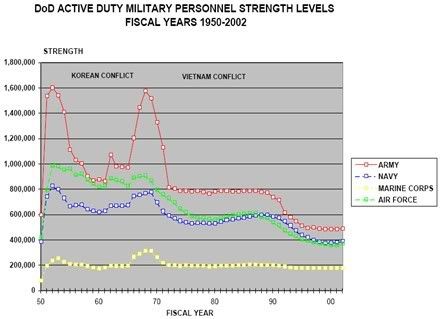

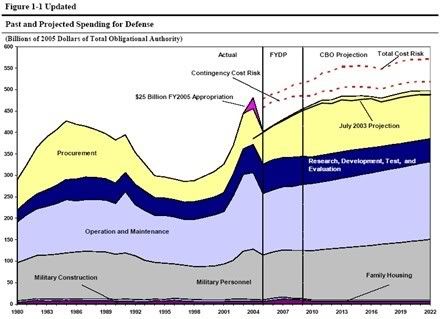
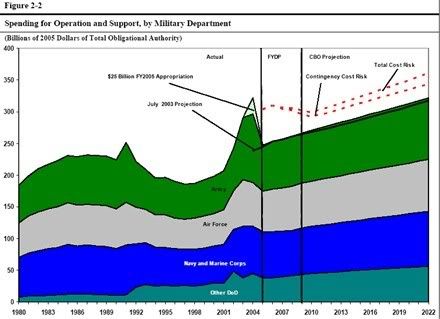
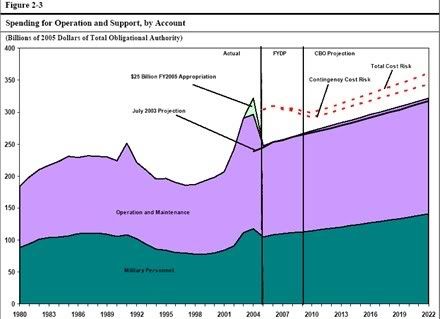
Pay increases for uniformed medical personnel account for less than 5 percent of the overall medical O&S growth that CBO projects between 2007 and 2024. Various other expenses—most notably, accrual charges, pharmaceuticals, and purchased care and contracts—play a much larger role (see Figure 5).15 Accrual payments make up nearly 46 percent of the projected increase in medical spending, growing at a nominal rate of 6.25 percent a year after 2007.16 In CBO’s estimation, accrual charges will double in real terms between 2007 and 2024.I'm one of those pessimists concerning the growth in entitlement spending (pdf), and rising (discretionary) medical costs for active duty and veterans can only add pressure to the system.
Footnotes:
15. Pharmaceuticals include those dispensed by military medical treatment facilities, the military’s retail pharmacy network, nonnetwork retail pharmacies, DoD’s mail-order pharmacies, and private-sector contractors under TRICARE. Purchased care and contracts include managed care support contracts, various other types of purchased care, and supplemental care for active-duty personnel. In the past, that category also included pharmaceuticals; but after 2001, DoD began accounting for pharmaceuticals separately in the FYDP.
16. The independent Board of Actuaries for DoD’s Medicare-Eligible Retiree Health Care Fund annually updates its estimate of the accrual charges necessary to fund the TRICARE For Life program, which is discussed in greater detail later. [my note: page 9 of the report goes into greater detail on the TRICARE For Life program and you can find more information on the Board of Actuaries at the DoD Office of the Actuary.]
Iraq 1.0 (March 19, 2003 - April 14, 2003): The "Regime Change" phase. That was our successful invasion of Iraq. Oh, for those glory days.
Iraq 1.1 (April 8, 2003 - May 11, 2003): The "Garner" phase. Major combat is over. Garner wasn't in Baghdad more than a month.
Iraq 1.2 (May 12, 2003 - June 28, 2004): The "Bremer" phase. Commence the insurgency. Saddam's sons killed, Saddam captured. We've got the Baathist bull by the horn and the jihadi tiger by the tail now. Muqtada al-Sadr goes on a rampage. Abu Ghraib.
Iraq 1.3 (June 29, 2004 - June 20, 2005): The "Negroponte" phase. More of the same, but more of it. And not in a good way. The insurgency's been effective in keeping 100,000-150,000 US troops deployed in Iraq. Call-ups, Stop-Loss, and rotations to support that are taking their toll. Wounded and fatalities are building up. The rate of wounded and killed is not high compared to history, but the intensity of the war may be similar to Vietnam.
Iraq 1.4 (June 21, 2005 - February 9, 2007): The "Khalilzad/Casey" phase. Civil War, or not. There were warnings in 2004. There were concerns in 2005 about the growing sectarian violence. In 2006, John Burns returned from Iraq and gave his (in)famous interview on Bill Maher's Real Time. By the end of 2006, especially after the Democrats took control of the House and Senate in the November elections, the "Civil War" debate seemed academic, semantic and moot. "Stay the Course" became "Surge" and Presidential candidates lined up for 2008.
Is it time for Iraq 2.0, the "Khalilzad/Petraeus" "Crocker/Petraeus" phase? I hope so. I'm ready for some good news in Iraq. Even the "So Far So Good" news. I'm ready for Phase 4: Doing it. I'm not looking for sudden success, just steady progress. The kind of progress that justifies answering the question, "If you knew then what you know now, ..." with, "Ask me again in 20 years."
Previous: Iraq v1.4
| I saw a ghost one night. She was beautiful to see. Floating on translucent winds, she was reaching out for me. I answered her with silence, controlled by awe and fear. Then I noticed she was crying. Her cheek glistened with a tear. "Victor," I heard her beckon as she reached once more for me. "My Lady, you're mistaken", I responded tenderly. "Are you my dear Victor, I've searched for endlessly? For now we'll be together for all eternity." I thought of her sweet offer, to know unending bliss; for in her heart, eternal love and heaven in her kiss. I searched my mind and wondered if I was wrong before. If actually I was the man that she was looking for. But I knew that I was not the one who held this woman's heart, and with a tear in mine own eye I begged her to depart. And as I watched her fade away, I felt her anxious pain and realized that she'd go on calling out his name. That's when I first realized the strength in three small words; that I had often tossed around as breadcrumbs to the birds. Not even death can overcome these words when spoken true. So be sure of your sincerity when professing, "I love you." Published in ecesis, April 2005, p. 19 |  Sketch by Y. Fei 'Kata' Leung. Reprinted with permission. |
Because you never know what your neighbor is concocting in his basement ...
TEEN GOES NUCLEAR: Creates fusion in his home
"Thiago Olson, 17, stands near his nuclear fusion reactor, which he calls "the Fusor," at home in Oakland Township on Friday.Radioactive Boy Scout
For two years, Olson researched what he would need and scrounged for parts from eBay and the hardware store. Flanges and piping? Check. High-voltage X-ray transformer? Check. Pumps, deuterium source, neutron bubble dosimeter? Check, check, check.You can read more at The secret world of amateur fusion (pdf) and The Open Source Fusor Research Consortium.
Tianhui "Michael" Li, 17, of Portland, submitted a physics entry to the Intel Science Talent Search based on his three-year study of inertial-electrostatic confinement (IEC), a radically different and significantly less costly way of confining nuclear fusion than conventional methods. Michael had already built two IEC reactors prior to the most recent phase of his research, which was conducted at the Propulsion Research Laboratory of NASA's Marshall Space Flight Center....

Four seniors named Marshall ScholarsNow you know ...
Princeton seniors Tamara Broderick, Neir Eshel, Tianhui (Michael) Li and P.G. Sittenfeld have been awarded 2007 Marshall Scholarships for graduate study in England....
Li, who is from Portland, Ore., is a computer science major and a certificate candidate in mathematics. He will enroll in a one-year master's program in mathematics at Cambridge, and then plans to pursue doctoral research in mathematics, focusing on information theory.
Over at Assignment Zero there is a discussion about the changing role of experts in the "new" media ecosystem:
In a traditional model the expert is regarded as the keeper of information, ideas and knowledge. In a dispersed network, the expert has some serious competition. If experts aren't the sole source for valuable information anymore, what makes them an expert? How do their roles change?Robin Sloan (of EPIC 2014 fame) comments:
Besides being keepers of information, experts are also the people we go to for predictions, for guidance -- especially in traditional journalism. A standard trend piece goes like this: You interview some representative "data points," then go to an expert to ask what it all means, how it's going to play out. In fact, I feel like I see experts doing much MORE prediction than education in the media -- especially in domains like politics, technology, etc.I prefer to think of expertise in terms of a Data, Information, Knowledge, Wisdom (DIKW) hierarchy. I think this would also be helpful for reporters to understand what their readers perceive concerning the quality and quantity of "truth" in their news. DIKW comes from the study of Knowledge Management and Information Science. A paper by Nikhil Sharma discusses the origin of the Data Information Knowledge Wisdom Hierarchy. I would also recommend a paper by Gene Bellinger, Durval Castro, and Anthony Mills which discusses the role 'understanding' plays in Russell Ackoff's original version of the DIKW hierarchy.
Unfortunately, there is evidence that experts are no good at making predictions.
I suspected at the outset that we as a society would be better off if we held experts -- be they pundits in the public arena or intelligence analysts behind the scenes -- systematically accountable to standards of evidence that command broad assent across the spectrum of reasonable opinion. Subsequent findings from this project -- as well as events over the last twenty tears -- have reinforced my suspicion that there is something wrong with existing mechanisms for getting to the truth both in the media-driven marketplace of ideas and in the top-secret world of intelligence analysis.Everybody’s An Expert
No one is paying you for your gratuitous opinions about other people, but the experts are being paid, and Tetlock claims that the better known and more frequently quoted they are, the less reliable their guesses about the future are likely to be. The accuracy of an expert’s predictions actually has an inverse relationship to his or her self-confidence, renown, and, beyond a certain point, depth of knowledge. People who follow current events by reading the papers and newsmagazines regularly can guess what is likely to happen about as accurately as the specialists whom the papers quote. Our system of expertise is completely inside out: it rewards bad judgments over good ones.
Plato: Symposium
Suppose Hephaestus, with his instruments, to come to the pair who are lying side, by side and to say to them, "What do you people want of one another?" they would be unable to explain. And suppose further, that when he saw their perplexity he said: "Do you desire to be wholly one; always day and night to be in one another's company? for if this is what you desire, I am ready to melt you into one and let you grow together, so that being two you shall become one, and while you live a common life as if you were a single man, and after your death in the world below still be one departed soul instead of two-I ask whether this is what you lovingly desire, and whether you are satisfied to attain this?"-there is not a man of them who when he heard the proposal would deny or would not acknowledge that this meeting and melting into one another, this becoming one instead of two, was the very expression of his ancient need. And the reason is that human nature was originally one and we were a whole, and the desire and pursuit of the whole is called love. [link added]

Scientific Method: Relationships Among Scientific Paradigms
Information Esthetics, an organization founded by map co-creator W. Bradford Paley, is giving away 25" x 24" prints of the Map of Science. Visit the Information Esthetics site to order a free print. (Shipping and handling are not included.)
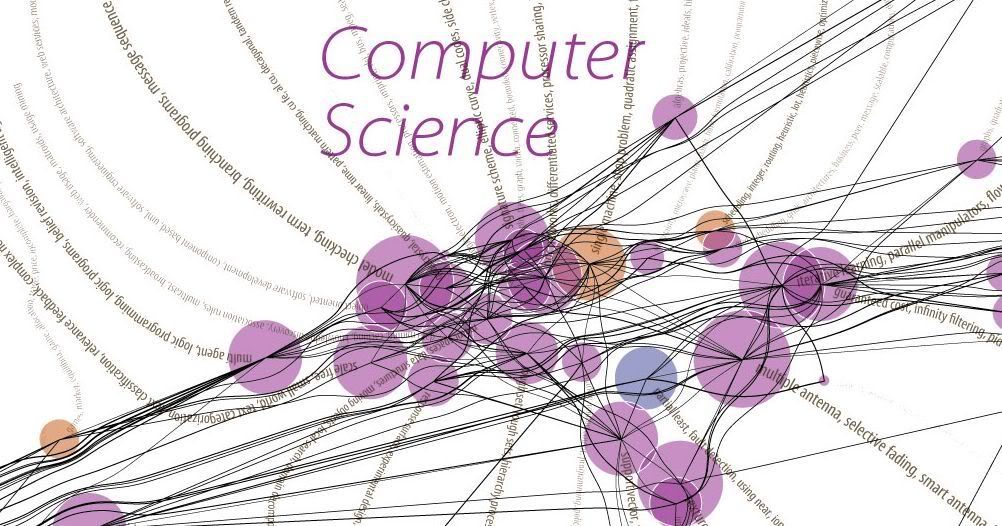
Colorado Woman Sues To Hold Web Crawlers To Contracts
... The Internet Archive, which spiders the Internet to copy Web sites for posterity (unless site owners opt out), is being sued by Colorado resident and Web site owner Suzanne Shell for conversion, civil theft, breach of contract, and violations of the Racketeering Influence and Corrupt Organizations act and the Colorado Organized Crime Control Act.Can A Spider Enter Into A Binding Contract?--Internet Archive v. Shell
In Internet Archive v. Shell, No. 06-cv-01726-LTB-CBS (D.Col. 2/13/2007), the Colorado federal district court decided that more facts were needed and refused to dismiss the breach of contract claim for failure to state a cause of action. Whether or not the claim will survive a summary judgment motion remains to be seen.Would this impact search engines that excerpt (derivative copying) in the same way? I guess it could depending on the site's restrictions.
... This lawsuit isn't about spiders. It's not about searching, finding or indexing or linking. It's about copying, storing, displaying and distributing without permission. It won't hurt Google or any other of those valuable search engines out there who are NOT copying. We LIKE the search engines. We use them. We are on them. They are valuable....IGeek? Sheesh.
Coalition operations receive YouTube treatment
"We want the American public, from an unfiltered vantage point, to be able to see what coalition forces and Iraqi security forces are doing here in Iraq," said Army Maj. Gen. William Caldwell, MNF-I spokesman.Coalition Servicemembers Reach Out to America via YouTube
The initiative first came about when Soldiers began brainstorming about how to reach out and share stories of what's happening in Iraq with a greater number of people. The group determined that the user-generated Web site would be a perfect venue for the more visually oriented, younger American audience. ...The MNF-Iraq Channel on YouTube is currently #40 - Most Subscribed (This Week).
The most popular, with more than 2,000 views, is a Jan. 24 clip from Operation Tomahawk Strike 11. The video shows Army Soldiers from the 2nd Infantry Division alongside soldiers from the 6th Iraqi Army Division engaging insurgents from a high-rise building during a series of targeted raids.
Video clips document action as it appeared to personnel on the ground and in the air as it was shot. We will only edit video clips for time, security reasons, and/or overly disturbing or offensive images.Combined with CENTCOM's videos (RSS) and the Pentagon Channel, that's a good deal of multimedia outreach to the American people and the world.
Headline: ‘Microsoft sucks’, says top blogger
Who's the "top blogger" you ask? Robert Scoble of Scobleizer. Did he really say that? Eh, sort of ...
...Microsoft’s Internet execution sucks (on whole). Its search sucks. Its advertising sucks (look at that last post again). ...It's like Microsoft isn't even trying to make the "news wars" between Googlezon and msn come true.
Microsoft isn’t going away. Don’t get me wrong. They have record profits, record sales, all that. But on the Internet? Come on. ...
Consider…ANSWER had a year to plan their well-publicized event and were hoping for around 100,000. They actually drew about 5,000-10,000, according to various news reports today. The Gathering of Eagles, on the other hand, had about six weeks to plan an unprecedented response - and with no advertising, no publicity, no celebrity or political endorsement, no news coverage, and no big money, we had about 30,000 boots on the ground!LifelikePundits.com at Gathering of Eagles! Mucho Video, Many Pictures!
But the war protesters have gone too far, Lee and others said. At a Jan. 27 antiwar rally, some protesters spray-painted the pavement on a Capitol terrace. Others crowned the Lone Sailor statue at the Navy Memorial on Pennsylvania Avenue with a pink tiara that had "Women for Peace" written across it.You remember how the political right turned Saddam Hussein into Hitler during the run-up to the war? Is it any better to have the political left trying to turn President Bush into LBJ & Hitler simultaneously?Word of those incidents ricocheted around the Internet.
Copyright ©
All rights reserved
Creative Commons License
| Solar X-rays: Geomagnetic Field: |
The views and opinions expressed on this web site are those of the author(s) and do not reflect the views of my employer, the official policy or position of any unit, the Department of the Army, Department of Defense, or the U.S. Government
Copyright © All rights reserved
Creative Commons License